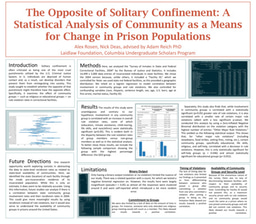- While all Laidlaw Scholars will be presenting their research at the Columbia Undergraduate Research Symposium in the fall, what are the more immediate expectations that you have for your research? Are you writing a paper? Will your research be part of a larger scientific study? Do you hope to produce an annotated bibliography that you reflect on down the line? Is your research now the first phase of a project you’ll continue to work on throughout the year, and/or next summer? Now that we are nearing the one month mark of the program, please write about your expectations for your research.
I have a lot of immediate expectations for my research. The most immediate of these, I think, will be to help me contextualize the importance of community in a variety of situations, such as in the prison population. I am really excited to see what other applications this could have, such as revolutionizing how I approach education. While that is somewhat less immediate, I do think that there will be more immediate changes to my how I approach my life as a result of this perspective shift. For the future, I would love if this helped to support my drive to helping bring more community to people.
- Why does your research matter? Explain the significance of the question you are investigating, and why you are interested in it.
I think my research is crucial because it could revolutionize how we approach, not only change-making, but how society as a whole works. If I can show that community can have a transformative impact on the criminal justice system, then maybe it could also have one on education, and mental-health, and physical health, and a variety of other areas.


Please sign in
If you are a registered user on Laidlaw Scholars Network, please sign in
Hi Alex! I’m fascinated by how you’re thinking about community as a force that can reshape systems, especially ones as entrenched as the criminal justice system. It makes me think about the connections between institutions like schools and prisons.
How do you see community playing a role in disrupting or transforming the school to prison pipeline? Do you think the same principles that might work in prisons—like restorative justice or mutual aid—can be applied in educational spaces to prevent incarceration in the first place? And what role do you think educators or students themselves can play in that process?
Thanks for the kind words. As for your question, absolutely! Next summer, I'm thinking about doing my second summer at a school and focusing on community there. So I guess we'll see!